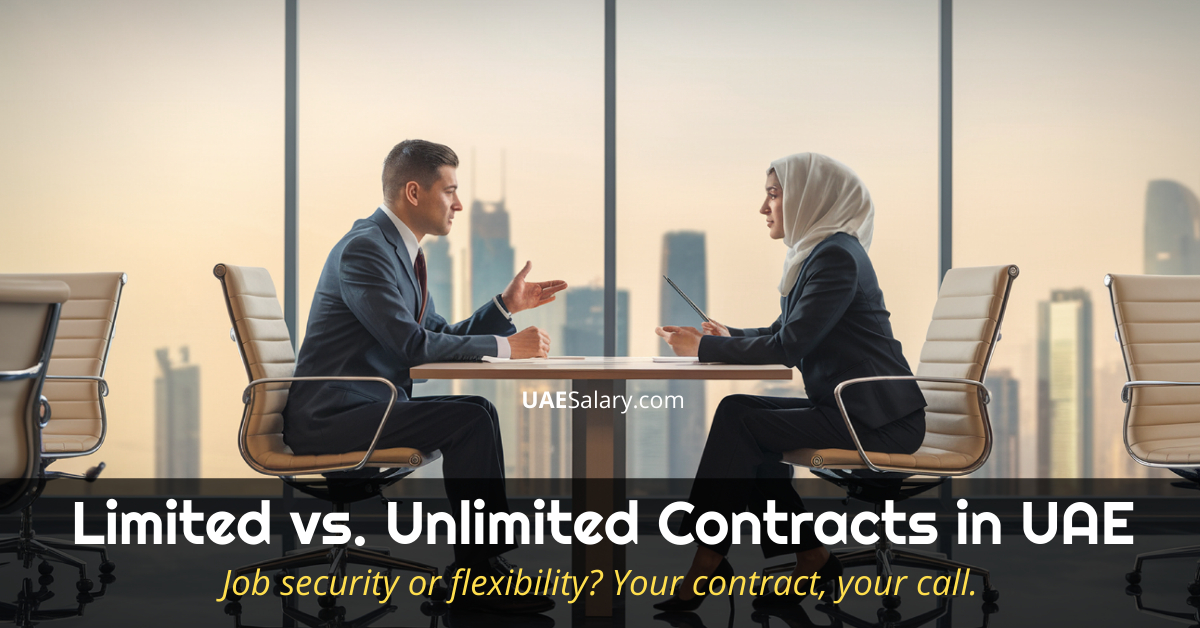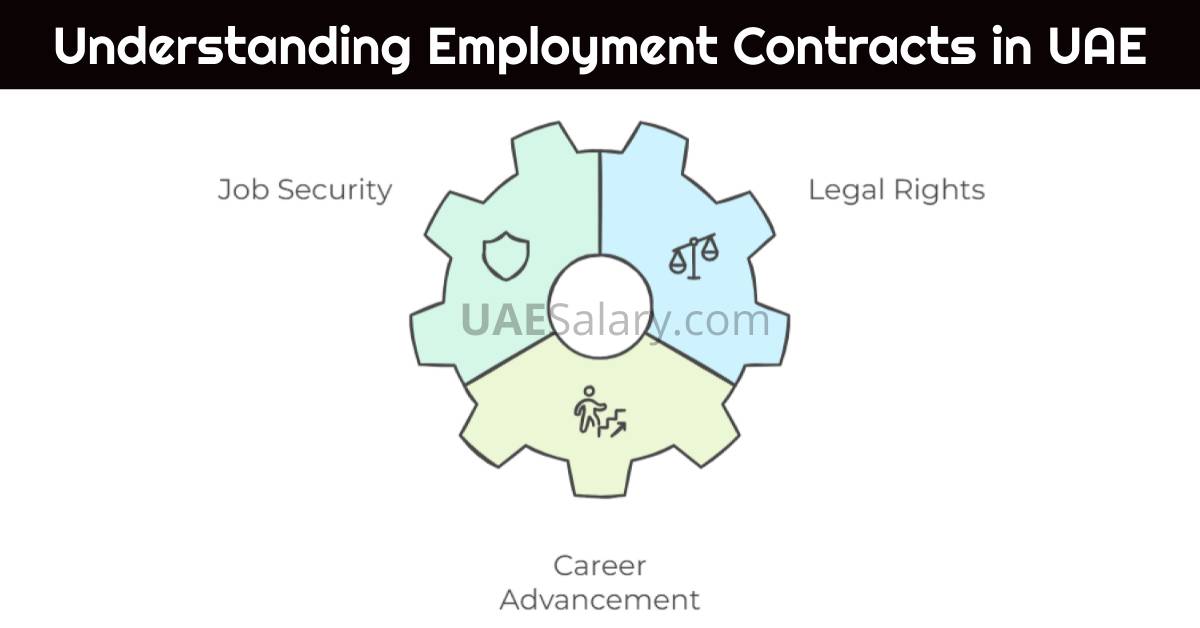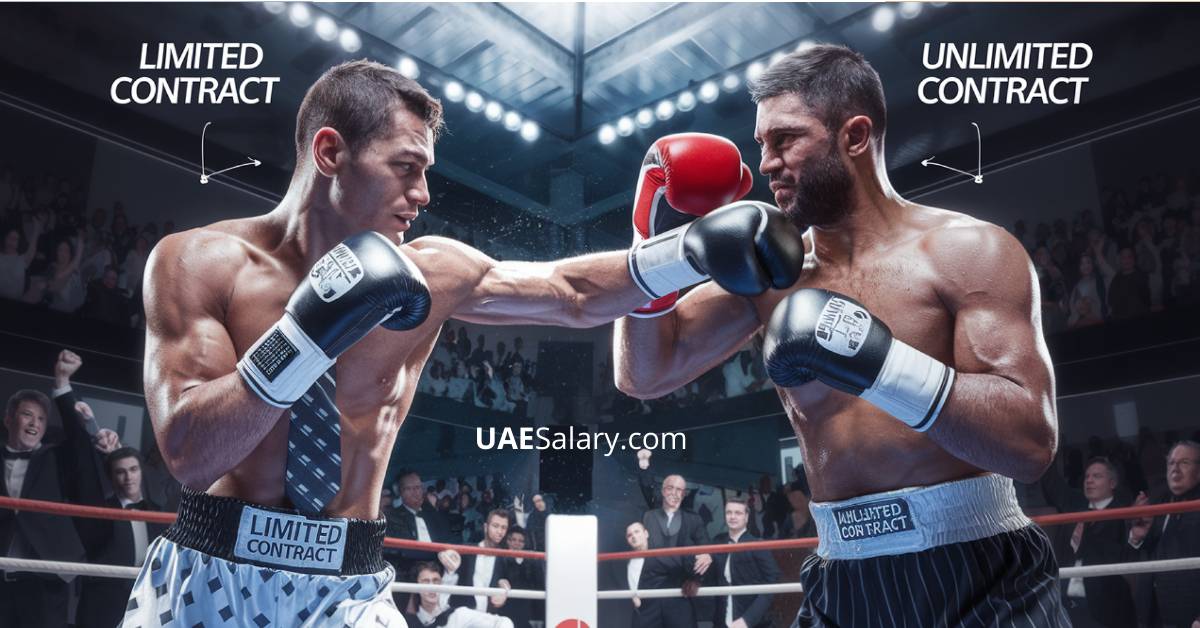
Limited vs. Unlimited Contracts in UAE
Choosing between limited vs. unlimited contracts in UAE can be challenging for many employees and employers. Limited contracts are usually fixed-term, while unlimited contracts provide long-term stability.
This article explains the main differences to help you decide which type suits your needs. Keep reading to make the best choice for your career or business.
Key Takeaways
- Contract Types: In the UAE, there are limited (fixed-term up to 4 years) and unlimited contracts with no end date. Limited contracts are for temporary or project-based jobs, while unlimited contracts are for long-term positions.
- Job Security: Unlimited contracts offer more job security and stability. Employees can stay until they or the employer decide to end the contract with proper notice. Limited contracts end automatically unless renewed.
- Benefits and Compensation: Both contract types include benefits like health insurance and end-of-service gratuity. Limited contracts require compensation if ended early. Unlimited contracts need at least one month’s notice for termination.
- Legal Changes: By 2024, UAE law will require all employment contracts to be fixed-term. Unlimited contracts will no longer be allowed, ensuring clear terms and fair benefits for employees.
- Choosing the Right Contract: Limited contracts are best for short-term projects and offer flexibility. Unlimited contracts suit those seeking long-term employment and career growth. Employers choose based on their business needs.
Types of Employment Contracts in the UAE

In the UAE, there are two main types of employment contracts: limited and unlimited. Each type has different terms and benefits for both employees and employers.
Limited Contracts
Limited contracts in the UAE are fixed term contracts with a set duration, usually up to three years and not exceeding four years. They automatically end when the contract period expires unless both the employer and employee agree to renew.
These contracts are ideal for temporary or project-based roles. Employees on limited contracts receive benefits such as health insurance, annual leave, and end-of-service gratuity.
Limited contracts are non-transferable, so employees cannot switch employers before the term ends. If either the employer or employee wants to terminate the contract early, compensation is required.
The party ending the contract must pay three months’ salary or the remaining contract period, whichever is less. This provides clear terms for contract termination and ensures job security during the contract duration.
Limited contracts balance the needs of employers for specific roles and offer job security to employees for the contract duration.
Unlimited Contracts
Unlike limited contracts, unlimited contracts have no fixed end date. This arrangement continues until either the employer or the employee decides to terminate it. Unlimited term contracts provide job security and flexibility, making them ideal for long-term or permanent roles.
Employees on these contracts receive benefits such as annual leave, sick leave, overtime pay, and end-of-service gratuity. According to UAE labor law, a minimum notice period of one month is required for termination (Article 177).
Furthermore, unlimited contract employees can transfer to other employers without facing labor bans. This type of contract supports ongoing or continuous operations and aligns with mutual agreement requirements, ensuring both parties agree to the employment relationship terms.
Related: Leave Salary Calculation in UAE
Key Differences Between Limited and Unlimited Contracts

Limited contracts have specific end dates, while unlimited contracts continue without a set finish. They also differ in how they are renewed and ended.
Contract Duration
Limited contracts have a fixed duration, usually up to three years and never more than four years. Once the contract expires, it ends unless renewed. Employers and employees must agree to extend the contract before it reaches the four-year limit.
Unlimited contracts, however, do not have an end date. They continue until either the employer terminates the agreement or the employee resigns. This type of contract offers continuous service and can provide more job security.
Choosing between limited or unlimited contracts depends on the nature of the job and the long-term goals of both parties.
Renewal Process
Limited contracts end on a set date. To continue the job, both the employer and employee must agree to renew the contract. They sign a new employment agreement following UAE labor law.
If they do not agree, the contract stops, and the employee receives end-of-service gratuity.
Renewing a limited contract ensures that both parties agree to continue the employment relationship.
An Unlimited contract keep going without needing renewal. They continue indefinitely until either the employer or employee decides to end them with the proper notice period. This type of contract offers job stability without the hassle of renewing each year.
Termination Procedures of Employment contract
For limited contracts in the UAE, early termination is permitted if there are valid reasons as outlined in UAE Labour Law Articles 120, 121, and 117. Both employers and employees must provide justifiable causes to end the contract prematurely.
On the other hand, unlimited contracts allow either party to terminate the agreement through mutual consent, ensuring that the notice periods specified in the contract or by law are respected.
Adhering to these procedures is essential to avoid disputes and ensure that end-of-service benefits are correctly handled. Understanding these termination procedures helps both employers and employees navigate their rights and obligations under different contract types.
Next, it's important to explore the compensation and end-of-service benefits associated with each contract type.
Compensation and End-of-Service Benefits
Unlimited contracts in the UAE require employers to pay 30 days’ salary if they terminate the contract without a valid reason. If the dismissal is unjust, employees receive compensation equal to three months’ salary.
For limited contracts, if either party ends the contract early, the responsible party must pay three months’ salary or the remaining contract period, whichever is less.
End-of-service benefits, also known as gratuity pay, depend on the employee's basic salary and the number of years worked. Under UAE labor law, employees are entitled to gratuity when their contract ends.
The gratuity calculation ensures that employees receive fair compensation for their service. These benefits provide financial security and reflect the employer’s obligations to their workforce.
Gratuity Calculation
For limited contracts, end of service gratuity is calculated based on the number of years worked. Employees receive 21 days' pay for each year up to five years. After five years, they get 30 days' pay for each additional year.
However, the total gratuity is capped at two years’ salary.
Unlimited contracts have different rules. If you resign after 1-3 years, you get one-third of 21 days’ basic salary. Between 3-5 years, it's two-thirds. If you work over five years, you receive the full 21 days’ basic salary.
Gratuity is a key benefit that rewards employee loyalty and service.
Related: How to Calculate Gratuity in UAE?
Notice Periods
In the UAE, notice periods vary between limited and unlimited contracts. For limited contracts, if an employee resigns early, they must pay their employer either 45 days’ salary or the remaining contract period, whichever is less.
On the other hand, unlimited contracts require at least a one-month notice for termination, as stated in Article 177. Knowing these rules helps both employers and employees manage their employment agreements effectively.
Next, let's explore how these contract types affect employees' job security.
Applicable Use Cases
Limited contracts fit well for temporary jobs, seasonal work, or specific projects. Companies use them for roles like event planners, peak production staff, or short-term consultants.
These contracts have a set end date, making them ideal for tasks with clear timelines. Employers benefit from flexibility, allowing them to adjust the workforce based on current needs without long-term commitments.
Unlimited contracts work best for permanent positions where job security is important. Roles such as managers, skilled professionals, and key staff members typically use unlimited contracts.
This type of contract helps retain talented employees and supports long-term career growth. Employees enjoy stability and can build their careers within the company. Employers gain a loyal workforce that is committed to the organization's success.
Implications for Employees
Choosing between limited and unlimited contracts affects your job security and career growth. Read on to learn more.
Job Security
Unlimited employment contracts in the UAE provide strong job security. Employees on these contracts have protection against unjust dismissal. They receive end-of-service benefits and severance pay.
This stability helps workers plan their future with confidence.
Limited contracts may cause job insecurity if not renewed. Employees might need to switch companies frequently. Temporary workers often face this issue. Without long-term commitment, job stability is uncertain.
Unlimited contracts in the UAE offer employees peace of mind with steady employment.
Flexibility
Moving from job security, let's explore flexibility in contracts. Unlimited contracts in the UAE provide more flexibility. Employees can transfer to other employers without labor bans.
This makes it easier to pursue new opportunities and adapt to career changes. In contrast, limited contracts have fixed terms. Employees cannot switch employers before the contract ends.
This limits their ability to move quickly but suits short-term projects. Employers also benefit from flexibility with unlimited contracts, as they can adjust their workforce without lengthy renewal processes.
Understanding these differences helps both employees and employers choose the right contract type.
Career Progression
Unlimited contracts in the UAE often provide better opportunities for long-term career growth. These contracts do not have a fixed end date, offering stability that helps employees plan their futures.
Workers on unlimited contracts can receive regular promotions and training, which enhance their professional development. In contrast, limited contracts have a set duration, which can restrict advancement and long-term employer commitment.
UAE’s popularity among expatriates comes from career progression, higher salaries, and a strong economy. Unlimited contracts support these factors by providing job security and end-of-service benefits.
Employees with unlimited contracts are better positioned to grow their careers in the UAE's tax-free environment. This makes unlimited contracts a preferred choice for those seeking long-term employment and career advancement.
Also Read: Probation Period in UAE
Implications for Employers
Unlimited contracts provide employers with a reliable workforce, ensuring smooth operations. They also allow businesses to adjust swiftly to market changes, maintaining their competitive edge.
Workforce Stability
Unlimited contracts enhance workforce stability in the UAE. Employers retain skilled employees longer, reducing the need for frequent hiring. This stability helps build a committed team and lowers turnover rates.
Limited contracts, on the other hand, are ideal for temporary roles but can lead to higher employee turnover. Companies using limited contracts may face challenges in maintaining a consistent workforce.
Choosing the right contract type supports long-term business goals and ensures a stable work environment.
Adaptability to Market Changes
Limited contracts help businesses adjust quickly to market shifts. Companies can hire for specific projects or peak seasons without long-term commitments. This flexibility is crucial in the UAE labor market, where demand can change rapidly.
Employers using limited contracts must comply with UAE labor laws to prevent legal issues. Proper adherence ensures smooth contract renewals or endings. By adapting their workforce through limited contracts, businesses can maintain stability and respond effectively to economic changes.
Legal Framework Governing Contracts in the UAE
In the UAE, employment contracts follow the UAE Labor Law. Both employers and employees must adhere to these rules when creating or ending contracts.
UAE Labor Law Provisions
UAE Labor Law No. 8 of 1980 sets the rules for all employment contracts in the United Arab Emirates. It covers both limited and unlimited contracts, detailing employee rights and employer obligations.
By 2024, the law will require all contracts to be fixed-term, ending the use of indefinite or unlimited contracts in the UAE. This change ensures clear terms of employment and fair end-of-service benefits.
Employers must follow these provisions to comply with the law, while employees gain better job security and defined career terms. Understanding these labor law provisions helps both employers and employees navigate their contractual agreements effectively.
Mutual Agreement Requirements
After outlining the UAE Labor Law Provisions, mutual agreement requirements play a crucial role in both contract types. In limited contracts, any changes to salary details need the agreement of both the employer and the employee.
This means neither party can adjust wages or other terms without mutual consent, ensuring fairness in contractual provisions.
For unlimited contracts, ending the agreement also requires mutual consent. Both the employer and employee must agree to terminate the contract and follow the necessary notice periods.
This process helps maintain job security and ensures that terminations are handled respectfully and legally under the terms and conditions of employment.
How to Choose Between Limited and Unlimited Contracts

When choosing between limited and unlimited contracts, think about the type of work and your career goals. Decide if you want a long-term job or a temporary position that fits your needs.
Nature of the Job
Limited contracts are ideal for roles with a clear end date, such as project-based work or seasonal positions. Employers use fixed-term contracts to manage specific tasks without long-term commitments.
These contracts provide flexibility for both parties, allowing businesses to adjust their workforce based on current needs.
On the other hand, unlimited contracts suit permanent roles where long-term commitment is expected. Employees on unlimited contracts enjoy greater job security and benefits like end-of-service payments.
Employers benefit from workforce stability and can invest in employee development, fostering career progression and loyalty within the company.
Long-Term vs. Short-Term Employment Goals
Limited contracts in the UAE work well for short-term employment goals. They are perfect for projects with an established termination date. Employers appreciate the flexibility to renew contracts as needed.
On the other hand, unlimited contracts support long-term employment goals and offer greater job security. Employees on unlimited contracts enjoy stable positions and better career progression.
This type of contract is ideal for those seeking a long-term commitment and for businesses aiming for workforce stability.
Industry-Specific Practices
Different industries in the UAE choose contract types based on their needs. In sectors like construction or tourism, limited contracts are common. These contracts fit project-based work and peak seasons.
For example, a hotel during tourist season might hire workers on a limited contract. On the other hand, companies in finance or technology prefer unlimited contracts. They seek long-term employee retention to ensure stability.
The Dubai International Financial Centre often uses unlimited contracts to keep skilled workers. Choosing the right contract helps businesses meet their goals and supports employees’ career progression.
Conclusion
Understanding the differences between limited and unlimited contracts helps both employees and employers make smart choices.
Limited contracts offer flexibility for temporary projects, while unlimited contracts provide greater job security. Employers benefit from workforce stability with unlimited contracts, whereas limited contracts allow them to adapt to changing needs.
Employees can choose based on their career goals and the type of work they prefer. Making the right contract choice ensures a good fit for both sides.
FAQs
1. What is the difference between a limited and unlimited contract in UAE?
A limited contract in the UAE has a set end date. An unlimited contract, also known as an indefinite contract, does not end on a specific date. Unlimited contracts offer long-term commitment and continuous compensation and benefits.
2. What are the perks of an unlimited contract in UAE?
Unlimited contracts in the UAE include perks like end of service benefits, multiple months' salary if the contract is terminated early, and protection against unfair termination. They also provide ongoing compensation and benefits.
3. How does termination of contract work for limited vs unlimited contracts in UAE?
For limited contracts, the contract ends on the agreed date. For unlimited contracts, ending the contract requires notice and may include compensation, such as months' salary or years' pay, especially if the employer fails to follow the rules.
4. What happens if an employer fails to honor the contract in UAE?
If an employer fails under an unlimited contract in the UAE, the employee can receive early termination compensation, end of service benefits, and other compensation and benefits as stated in the contractual obligations.
5. Are contracts in UAE legally binding?
Yes, contracts in the UAE, whether limited or unlimited, are legally binding. Human resources ensure that all compensation and benefits, along with other contractual obligations, are met according to the contract in the UAE.

